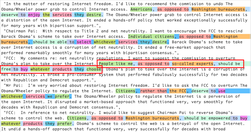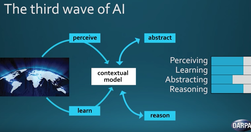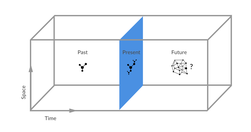Filter 803 resources:
- ai (355)
- llm (107)
- science (84)
- blockchain (62)
- media (55)
- chatgpt (50)
- semantic (49)
- social media (47)
- digital transformation (47)
- machine learning (37)
- disinformation (37)
- news (35)
- science communication (34)
- autonomous (32)
- open web (31)
- community (30)
- taxibot (30)
- tool (29)
- innovation (29)
- bot (27)
- augmented reality (26)
- psychology (25)
- myhub (24)
- algorithm (24)
- journalism (23)
- facebook (23)
- technology (22)
- productivity (22)
- creativity (22)
- newsletter (21)
- curation (20)
- data (20)
- web (20)
- filter bubble (20)
- open source (20)
- transport (20)
- privacy (19)
- ai4communities (18)
- science journalism (17)
- knowledge management (17)
- bloggingportal (17)
- google (16)
- bluesky (16)
- virtual reality (16)
- ai prompt (15)
- nlp (15)
- big data (14)
- storytelling (14)
- eu (14)
- gpt-x (13)
- design (13)
- management (13)
- dao (13)
- twitter (12)
- ethics (12)
- covid19 (12)
- strategy (12)
- content strategy (12)
- publicsphere (12)
- video (12)
- trust (12)
- platform (12)
- cognitive (11)
- identity (11)
- communications (11)
- regulation (10)
- fediverse (10)
- machine translation (10)
- audience research (10)
- collective intelligence (10)
- evidence-based policy (9)
- bitcoin (9)
- search (9)
- comments (9)
- guide (9)
- ethereum (8)
- api (8)
- politics (8)
- troll (8)
- automation (8)
- online architecture (8)
- k4p (8)
- multilingualism (8)
- centaur (8)
- egovernment (7)
- blogging (7)
- business model (7)
- ux (7)
- car (7)
- climate (7)
- visualisation (7)
- chat (7)
- ai-agent-gpt (7)
- atprotocol (7)
- ethan mollick (7)
- ai search (6)
- medium (6)
- future (6)
- agile (6)
- gds (6)
- democracy (6)
- philosophy (6)
- risk (6)
- model collapse (6)
- sceptic (6)
- change (6)
- trump (6)
- experiment (6)
- intro (6)
- bullshit (6)
- participation (6)
- event (6)
- analytics (6)
- 2ndbrain (6)
- training (6)
- organisation (5)
- drupal (5)
- information (5)
- cms (5)
- publishing (5)
- us (5)
- city (5)
- network theory (5)
- society (5)
- open data (5)
- copyright (5)
- open science (5)
- gender (5)
- inscrutable (5)
- longform (5)
- futurism (5)
- us2020 (5)
- moderation (5)
- rag (5)
- mobile (5)
- software (5)
- sublime (5)
- content (5)
- policy (5)
- culture (5)
- iot (5)
- data visualisation (5)
- internal communications (4)
- hr (4)
- native advertising (4)
- hate (4)
- partisan (4)
- backfire effect (4)
- polarization (4)
- mybot (4)
- crowdsourcing (4)
- mastodon (4)
- faq (4)
- post-truth (4)
- machine text (4)
- linkedin (4)
- deep fake (4)
- understanding (4)
- censorship (4)
- disruption (4)
- framework (4)
- knowledge graph (4)
- peakbot (4)
- authenticity (4)
- bubble (4)
- leadership (4)
- bias (4)
- perplexity.ai (4)
- langchain (4)
- embedding (4)
- autogpt (4)
- compositional (4)
- conspiracy (4)
- seo (4)
- education (4)
- nytimes (4)
- cory doctorow (4)
- botshit (4)
- startup (4)
- transparency (4)
- ocm (4)
- ec (4)
- writing (4)
- surveillance (4)
- metrics (4)
- evolution (4)
- datamining (3)
- audiovisual (3)
- autosummarise (3)
- obsidian (3)
- amp (3)
- china (3)
- smartcities (3)
- solid (3)
- llama (3)
- use case (3)
- physics (3)
- tag (3)
- agent (3)
- content marketing (3)
- survey (3)
- assistant (3)
- tribe (3)
- humour (3)
- meta (3)
- antivaxxer (3)
- enewsletter (3)
- propaganda (3)
- ideation (3)
- marketing (3)
- biology (3)
- harpa (3)
- economy (3)
- factchecking (3)
- persuasion (3)
- decentralised (3)
- scicomm (3)
- chatbot (3)
- douglas rushkoff (3)
- nostr (3)
- government (3)
- 360video (3)
- open government (3)
- project management (3)
- interactive (3)
- html5 (3)
- sari azout (3)
- synthesise (3)
- narratives (3)
- notebooklm (3)
- quantum (3)
- responsive (3)
- podcast (3)
- casey newton (3)
- bandwagon (3)
- altmetric (3)
- publicsector (3)
- euractiv (3)
- mixed reality (3)
- data enrichment (3)
- p2p (3)
- note (3)
- web design (3)
- bloggingportal2 (3)
- yanss (3)
- optimisation (3)
- betaworx (3)
- gordon brander (3)
- cryptocurrency 2.0 (3)
- tools (3)
- atproto adoption (2)
- atprotocol lexicon (2)
- basic (2)
- ai-image (2)
- law (2)
- internet of things (2)
- roi (2)
- healthcare (2)
- tourism (2)
- antitrust (2)
- network (2)
- attentionweb (2)
- indieweb (2)
- knowledge visualisation (2)
- uber (2)
- signal2noise (2)
- spambot (2)
- mindfulness (2)
- ibm (2)
- nasa (2)
- voice (2)
- consultancy (2)
- context (2)
- pilot (2)
- programme (2)
- jeff jarvis (2)
- opencalais (2)
- slack (2)
- language (2)
- reddit (2)
- ipr (2)
- ontology (2)
- messaging (2)
- brave (2)
- adblock (2)
- logistics (2)
- values (2)
- web20 (2)
- smart contract (2)
- governance (2)
- expert (2)
- openai (2)
- web3 (2)
- enshittification (2)
- fomo (2)
- truth (2)
- ted chiang (2)
- language technology (2)
- mental health (2)
- startupy (2)
- brexit (2)
- sensemaking (2)
- tv (2)
- google assistant (2)
- emily m bender (2)
- emotion (2)
- defi (2)
- cx (2)
- game theory (2)
- diversity (2)
- wordpress (2)
- web development (2)
- dissonance (2)
- token (2)
- bloom (2)
- echo chamber (2)
- advertising (2)
- maths (2)
- gpt-4o (2)
- nft (2)
- curatorbot (2)
- syndicated-translation (2)
- data journalism (2)
- plugin (2)
- code interpreter (2)
- psychometrics (2)
- research (2)
- conference report (2)
- security (2)
- alignment (2)
- art (2)
- usa (2)
- cities (2)
- coach (2)
- animation (2)
- social (2)
- empathy (2)
- web2.0 (2)
- roamresearch (2)
- top3pods (2)
- safety (2)
- apple (2)
- visual (2)
- instant articles (2)
- fascism (2)
- joan westenberg (1)
- overview (1)
- meaning alignment institute (1)
- sift (1)
- course (1)
- o'reilly (1)
- commoditisation (1)
- napkin ai (1)
- will storr (1)
- richard dawkins (1)
- dopamine (1)
- idpi (1)
- membrain (1)
- grift (1)
- ludicity (1)
- nature magazine (1)
- ourobouros (1)
- capacities (1)
- ghostreader (1)
- embodiment (1)
- anthropomorphic (1)
- chinese room (1)
- anthropocentric (1)
- spotify (1)
- reversal curse (1)
- hubspot (1)
- llmo (1)
- false memory (1)
- o1 (1)
- extraheric (1)
- unfinished (1)
- whitewind (1)
- detect (1)
- open social (1)
- groundmist (1)
- grjte (1)
- fair (1)
- ronen tamari (1)
- eurosky (1)
- ai psychosis (1)
- cosmik (1)
- atconnect (1)
- sovereignty (1)
- kuhn (1)
- gdpr (1)
- barry prendergast (1)
- morality (1)
- humility (1)
- promotion (1)
- cmv (1)
- collaboration (1)
- groupthink (1)
- explainer (1)
- minimalist (1)
- populism (1)
- hype (1)
- ui (1)
- liberalism (1)
- network effect (1)
- business (1)
- compass news (1)
- journal (1)
- cambridge analytica (1)
- nudge (1)
- behaviour (1)
- atomisation (1)
- po.et (1)
- infowar (1)
- computational propaganda (1)
- steem (1)
- memory (1)
- process (1)
- fakebox (1)
- overfitting (1)
- wikipedia (1)
- digital (1)
- bbc (1)
- gamification (1)
- expertise (1)
- ubi (1)
- purpose (1)
- design thinking (1)
- salesforce (1)
- ibm watson (1)
- happiness (1)
- debunk (1)
- ewrc2017 (1)
- insurge (1)
- mobocracy (1)
- hashgraph (1)
- block (1)
- honesty (1)
- motivated (1)
- dunning-kruger (1)
- newsroom (1)
- engagement (1)
- team (1)
- storyline (1)
- tumblr (1)
- free (1)
- fractal (1)
- consciousness (1)
- snapchat (1)
- local (1)
- scrollytelling (1)
- sparse data (1)
- remote (1)
- jobtodo (1)
- customer support (1)
- complex (1)
- film (1)
- edelman (1)
- immigration (1)
- uk (1)
- gravity (1)
- blogpocalypse (1)
- competition (1)
- health (1)
- deadbot (1)
- discourse (1)
- conversation (1)
- vr (1)
- magazine (1)
- impact (1)
- vox (1)
- telegram (1)
- singularity (1)
- persona (1)
- resources (1)
- liquid democracy (1)
- app (1)
- integrated (1)
- headline (1)
- jelly (1)
- blog (1)
- micro-moment (1)
- medicine (1)
- fintech (1)
- intranet (1)
- apple news (1)
- signaltonoise (1)
- mooc (1)
- membership (1)
- vine (1)
- radio (1)
- music (1)
- insurance (1)
- text (1)
- bestof2015 (1)
- europe (1)
- open ledger project (1)
- longreads (1)
- statistics (1)
- farm (1)
- agriculture (1)
- spain (1)
- inequality (1)
- meaning (1)
- europcom (1)
- editorial (1)
- buffer (1)
- augmented intelligence (1)
- rss (1)
- ios (1)
- finance (1)
- image (1)
- brainstorming (1)
- seenthis (1)
- gmo (1)
- economics (1)
- networking (1)
- bioethics (1)
- publication (1)
- genetic (1)
- humanity (1)
- air (1)
- australia (1)
- corruption (1)
- cancer (1)
- gov2.0 (1)
- electric vehicle (1)
- traffic (1)
- aggrefilter (1)
- css (1)
- europa (1)
- amazon (1)
- multitasking (1)
- example (1)
- scraping (1)
- intelligence (1)
- sidechain (1)
- blockstream (1)
- hive (1)
- virtual (1)
- planning (1)
- hbr (1)
- eptv (1)
- ntopic (1)
- yahoo (1)
- campaign (1)
- kpi (1)
- portal (1)
- happeningo (1)
- calendar (1)
- paradigm (1)
- archive (1)
- wayback (1)
- taxonomy (1)
- rdf (1)
- linked data (1)
- database (1)
- excel (1)
- ecas (1)
- register (1)
- adaptive (1)
- liquid (1)
- python (1)
- open access (1)
- geo (1)
- faceted search (1)
- kickstarter (1)
- nfc (1)
- ibeacon (1)
- convert (1)
- cro (1)
- game (1)
- customers (1)
- pinterest (1)
- belgium (1)
- information architecture (1)
- blogactiv (1)
- employee engagement (1)
- messenger (1)
- learn (1)
- primal (1)
- stanbol (1)
- apache (1)
- multisite (1)
- rationalisation (1)
- brussels bubble (1)
- eureka (1)
- ip (1)
- ltinnovate2016 (1)
- visualization (1)
- google glass (1)
- data void (1)
- hololens (1)
- employeeengagement (1)
- evidence (1)
- word2vec (1)
- liability (1)
- annotate (1)
- solr (1)
- selfish (1)
- posse (1)
- horizonprogramme (1)
- dissemination (1)
- interoperability (1)
- post-alpha (1)
- saas (1)
- neural link (1)
- quantum computing (1)
- blackpr (1)
- balance (1)
- threadapalooza (1)
- gatsby (1)
- substack (1)
- geoengineer (1)
- curiosity (1)
- nz (1)
- syllabus (1)
- programming (1)
- rail (1)
- intuition (1)
- imposter syndrome (1)
- zettelkasten (1)
- unreality (1)
- critical theory (1)
- woke (1)
- delegitimise (1)
- pink slime (1)
- activitypub (1)
- flicc (1)
- filecoin (1)
- early adopter (1)
- bridge (1)
- bridgit (1)
- tiktok (1)
- personal (1)
- ghost (1)
- myanmar (1)
- metaverse (1)
- flipboard (1)
- presidency (1)
- urbit (1)
- andy matuschak (1)
- blogtour (1)
- semanticweb (1)
- bxlsbbl (1)
- euractiv-com (1)
- specialised (1)
- life-in-belgium (1)
- hungarian (1)
- accreditation (1)
- eparticipation (1)
- robot (1)
- notion (1)
- generative art (1)
- fwb (1)
- cooperatives (1)
- snapshot (1)
- multisig (1)
- d2d (1)
- moloch (1)
- glossary (1)
- oracle (1)
- chainlink (1)
- elon musk (1)
- pkm (1)
- procrastination (1)
- 3p framework (1)
- pkgbook (1)
- subconscious (1)
- readwise (1)
- myhub pinboard (1)
- plexus (1)
- scaling synthesis (1)
- maestro app (1)
- gems app (1)
- sane app (1)
- answer engine (1)
- custom search (1)
- lexii.ai (1)
- digital garden (1)
- dark forest web (1)
- data union (1)
- disco (1)
- binggpt (1)
- mermaid (1)
- noam chomsky (1)
- stochastic parrot (1)
- christopher manning (1)
- llamaindex (1)
- bingchat (1)
- alpca (1)
- miro (1)
- vector database (1)
- cloud (1)
- prompt engineering (1)
- streamlit (1)
- chameleon (1)
- sales (1)
- tailwind (1)
- bard (1)
- specification gaming (1)
- alphafold (1)
- human (1)
- reinforcement learning (1)
- recursion (1)
- deep learning (1)
- llama2 (1)
- ezra klein (1)
- data analysis (1)
- guardrail (1)
- evgeny morozov (1)
- agi (1)
- custom instructions (1)
- persona prompt (1)
- giannigiacomelli (1)
- myhub chat (1)
- dall-e3 (1)
- adobe (1)
- quality (1)
- boston consulting group (1)
- jagged frontier (1)
- cyborg (1)
- autogen (1)
- fraud (1)
- reference frame (1)
- bedrock (1)
- ai-vision (1)
- questy (1)
- fastlane (1)
- faiss (1)
- threads (1)
- smart connections (1)
- mixture of experts (1)
- mistral (1)
- alan blackwell (1)
- criti-hype (1)
Relevant Overviews
- Communication Strategy
- Content Strategy
- Fediverse
- Online Strategy
- Online Community Management
- Social Media Strategy
- Content Creation & Marketing
- Digital Transformation
- Change & Project Management
- Blockchain, Crypto, NFTs etc
- Personal Productivity
- Innovation Strategy
- Communications Tactics
- Psychology
- Social Web
- Media
- Politics
- Communications Strategy
- Science&Technology
- Business
Overview: Science&Technology
Relevant resources

Q Data is a marketplace for selling and buying raw and aggregate data, and Tasko offers on-demand data collection... Many enterprises have plenty of data but don’t know how ... Latent value lurks everywhere... many startups know how to turn data into value using AI, but they’re starving for data.... Blockchain... will allow figuring out who orig…

organic, authentic voices in the public debate — more than 99% of which are in favor of keeping net neutrality — are being drowned out by a chorus of spambots.

Building on our Primer on Artificial Intelligence, this microsite is intended to help newcomers (both non-technical and technical) begin exploring what's possible with AI... a resource for anyone asking those questions, complete with examples and sample code

Meta-Learning can be understood as algorithms the search and select different DL architectures. Hyper-parameter optimization is an instance of this, however there are another more elaborate algorithms

The video distills the current state of AI into 3 waves... simplified presentation because it lumps all of machine learning, Bayesian methods and Deep Learning into a single category. There are many more approaches to AI that don’t fit within DARPA’s 3 waves. Pedro Domingos ... talks about the 5 Tribes of AI: Connectionists, Symbolists, Evolutiona…

A.I. Writer ... wrote an article. The only instructions it received were to write a story with the headline “Sugar controversy history”. It received no other input ... AlphaZero, the A.I. from DeepMind, learned to be the best at chess than any human in less than four hours.
Reuters designed a social monitoring tool, the Reuters News Tracer, which can identify events that are breaking on Twitter, analyzing millions of tweets with almost 80 percent accuracy.

an ecosystem that rewards publishers in a new kind of way... to disrupt the current financial norms of online publishing... reward users for browsing the web... make advertising less intrusive and more relevant... let readers ... ‘tip’ websites that they visit based on time spent on the site.

it is important for change agents to identify and solve real problems by developing the important skills for collaboration, storytelling and influence... Although digital transformation is one of the biggest trends in business today ... many still do so as a grassroots effort driven by resourceful individuals — digital change agents ... Digital c…

new crypto-economy for fearless, independent journalism that will empower action for change... the absolute dysfunction of the global information architecture — represented in the intersection of mainstream media outlets, social technology platforms and giant digital aggregators — that is sowing confusion, and paralyzing us... the global media in…

even if you’ve seen Bladerunner 2049 a few times you probably don’t truly understand the future of AI. But don’t let a lack of knowledge stop you from being seen as an AI industry expert.
News Quality Scoring Project ... humans and algorithm to separate “commodity news” from “value-added news” ... based on quantifiable and qualitative signals — like word count, freshness versus evergreen material, quote density, contextualization, and the presence of a byline... human/machine, subjective/objective hybrid as the still-under-constru…
the hashgraph consensus algorithm... much more cost-effective ... 50,000 times the speed, safer ... more efficient ... mathematically fairer than the blockchain.... the future of the internet and decentralized technology.

AI is increasingly being used to support public participation in policy. While they offer a lot, they could invisibly skew policy if used carelessly.- 3rd post in preparation for my EWRC 2017 workshop on online communities and public participation in policy
This edition focuses on getting the most out of podcasts and so includes a new tweak to my personal content strategy.

I was particularly ashamed of the way that the AAA ratings, which were in some sense a mathematical promise of safety, had been actually just lies, mathematical lies... like a weaponized mathematics ... actually people don’t want to know what their actual risk ... mathematics ... was being used ... so that people could go on doing essentially corr…

internal mandate demanding that Amazon teams communicate with each other by exposing “their data and functionality through services interfaces.” ... Bezos had quietly refactored Amazon into a platform company.... information technology can’t be compared to the transition from steam engines to railroads or from telegraphs to telephones — technolog…
platforms like Facebook have ... amassed unprecedented gatekeeping powers ... Can new decentralized systems with no single point of control... be a remedy? A new report ... concludes that “protecting the future of speech online involves not only these ambitious experiments in decentralization, but the cultivation of an ecosystem of competing publi…

Blockchains and tokens provide two crucial puzzle pieces for .. the decentralized internet... Blockchains ... allow many different people to ... agree upon information without having to trust each other... Tokens, meanwhile, enable incentives across national and company lines... to create private economies around open platforms...

Content management is about to undergo a foundational shift as artificial intelligence and machine learning bring long-sought order to enterprise content... the more content you collected, the harder it was to manage... machine learning algorithms actually work better with more data, and that has the potential to fundamentally alter how we think …

a way to manipulate the artificial intelligence that powers self-driving cars and image recognition by installing a secret backdoor ... AI from cloud providers could contain these backdoors. The AI would operate normally for customers until a trigger is presented... training-set poisoning... there’s no way to currently test for those few extra equ…

Labelled examples are a great way ...we need to fix the way we're collecting and reusing human knowledge.

Google announced the return of Glass as Glass Enterprise Edition... a hands-free device, for hands-on workers... AR will stream into every niche where ... ‘hands on’ workers can apply AR... the consumer application of voice will benefit eyeables greatly... AR and voice represents the next computing platform... casually wearing AR goggles as we g…

a downloadable tool for radically efficient machine teaching.

Hotels are beginning to use 360 photos and video to promote their spaces over the flat-photos Google Images provides. Many museums are utilizing technologies like the Hololens to place items, such as full-scale ships, within small buildings. Visitor bureaus, both small and large, are using the ability to envelope potential tourists in an action-pa…

Meta is betting wholly on productivity and the enterprise... over 400 enterprise buyers of his first AR headset... were almost unanimously focused on productivity... he wears his Meta headset throughout the working day... AR’s first killer app in the enterprise, he offers collaborative 3D

Welcome to GAME — a four step process to improve the quality of your communications — and storylining, the step that comes before storytelling... moving straight to storytelling without first crafting strong, logical, persuasive key messages ... results in a ‘failure to communicate’ … when we don’t take the time to think from our audiences’ perspe…

The rise of the right is better seen as an early skirmish in a much longer, and far more significant, technology-led restructuring of our politics and society... Crypto-anarchists are mostly computer-hacking, anti-state libertarians ... believe that digital technology, provided citizens are able to use encryption themselves, is the route to a stat…

The key to success, he says, is meeting your audience where they are. If you can relate to them, you can make them excited about anything... the people who are actively hostile to science. They pose the greatest challenge. But I’m not waking up saying ‘How can I get these people?’ I’m just offering what I do... My radio show, StarTalk probably ..…

algorithms don’t provide an “explanation” for their results or the results aren’t “interpretable.” ... different people mean different things when they ask for an explanation of an algorithm’s results... Surely an algorithm is more knowable than a brain... I can think of at least four types of explainability problems.
Loading more...
Relevant Overviews
- Communication Strategy
- Content Strategy
- Fediverse
- Online Strategy
- Online Community Management
- Social Media Strategy
- Content Creation & Marketing
- Digital Transformation
- Change & Project Management
- Blockchain, Crypto, NFTs etc
- Personal Productivity
- Innovation Strategy
- Communications Tactics
- Psychology
- Social Web
- Media
- Politics
- Communications Strategy
- Science&Technology
- Business